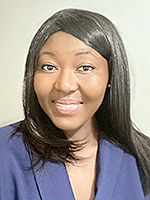Françoise N. Djoukeng, Esquire
2022 Temple Bar Scholar Report
 The United Kingdom in mourning over the death of its longest-serving monarch. An abrupt resignation of one prime minister followed by the installment of the first prime minister of color. The Temple Bar Scholarship coincided with these historic moments and provided an unforgettable immersion into Legal London. In short, it was a unique time to be a young American attorney absorbed into London’s extraordinary legal community.
The United Kingdom in mourning over the death of its longest-serving monarch. An abrupt resignation of one prime minister followed by the installment of the first prime minister of color. The Temple Bar Scholarship coincided with these historic moments and provided an unforgettable immersion into Legal London. In short, it was a unique time to be a young American attorney absorbed into London’s extraordinary legal community.
We had an incredible whirlwind tour of Legal London during the first week: the four Inns of Court, the Central Criminal Court of England and Wales, the Rolls Building, the Royal Courts of Justice, and the Supreme Court of the United Kingdom. We also attended excellent briefings with the Master of the Rolls, the Lord Chief Justice of England and Wales, the Trustee of the National Pro Bono Centre, the Chancellor of the High Court, the President of the Supreme Court of the United Kingdom, the Chair of the Bar Council, and executives of the Inns of Court and the Commercial Bar Association (COMBAR). The sights and sounds of the first week—ranging from observing an examination of a defendant on trial at the Old Bailey to listening to evensong by the Temple Church Choir—introduced some themes.
First, the instrumental role of religion in the foundations of English law and the narrative of British constitutionalism. The climax of the first week, the service for the Opening of the Legal Year at Westminster Abbey, marked a new year under a new sovereign. This learned gathering—with its liturgy—was a singular occasion. And the watershed surrounding this venerable tradition brought into sharp relief historic ecclesiastical efforts in the struggle for democracy. I was particularly impressed with the Temple—the home of two of London’s historic Inns of Court—a site I learned is at the heart of legal and constitutional London. And at the heart of the Temple is the Temple Church or as one scholar put it, the “Mother Church of the Common Law.” These institutions played an important role in the advancement of the Magna Carta and its legacy.
Another theme is London’s outsized role in the resolution of international commercial litigation. Many of the barristers I met commented that London is preferred as the “world’s commercial court” because of the accepted predictability and stability of English law and the quality of its legal practitioners. The influence of the United Kingdom’s legal system on common law jurisdictions remains remarkable. It was absolutely fascinating to learn about the historical reach and current docket of the Judicial Committee of the Privy Council as it is the final court of appeal for certain Commonwealth countries and other jurisdictions.
During the second and third weeks, I shadowed accomplished barristers who were unfailingly welcoming and generously gave of their time and attention. My placements at 4 Pump Court and Brick Court Chambers were immensely rewarding and educational. Over the course of two weeks, I attended several proceedings: a cross-examination for a complex contract dispute at the Technology and Construction Court, a case management conference for an international fraud dispute at the Business and Property Courts, and a shipping arbitration concerning damages for late redelivery of a time-chartered vessel conducted at the International Dispute Resolution Centre. I also had the chance to review written submissions for these matters, sit in on meetings between barristers, instructing solicitors, and clients, as well as perform brief research.
We had the honor of spending our fourth and final week of the program at the Supreme Court of the United Kingdom. Throughout the week, I had the great privilege of joining Lord Lloyd-Jones, Lord Leggatt, and Lord Stephens in chambers to discuss cases. I also had the opportunity to attend several days of oral argument and observe the Justices conferencing on permissions to appeal alongside the Justices’ judicial assistants. One of the arguments we observed concerned a decision out of Northern Ireland that involved application of Article 2 of the European Convention on Human Rights; it was fascinating to watch the Court grapple with its recent jurisprudence and foreign law.
The Temple Bar Scholarship offered an invaluable period of learning and exploration in addition to new friendships and professional connections. I would like to express my thanks for the hospitality and generosity of the Justices of the U.K. Supreme Court, COMBAR, and my individual hosts at 4 Pump Court and Brick Court Chambers. And I would like to express my gratitude to the American Inns of Court, and especially to Cindy Dennis, Judge Barbara M.G. Lynn, and BG (Ret.) Malinda E. Dunn for making this once-in-a-lifetime experience possible.